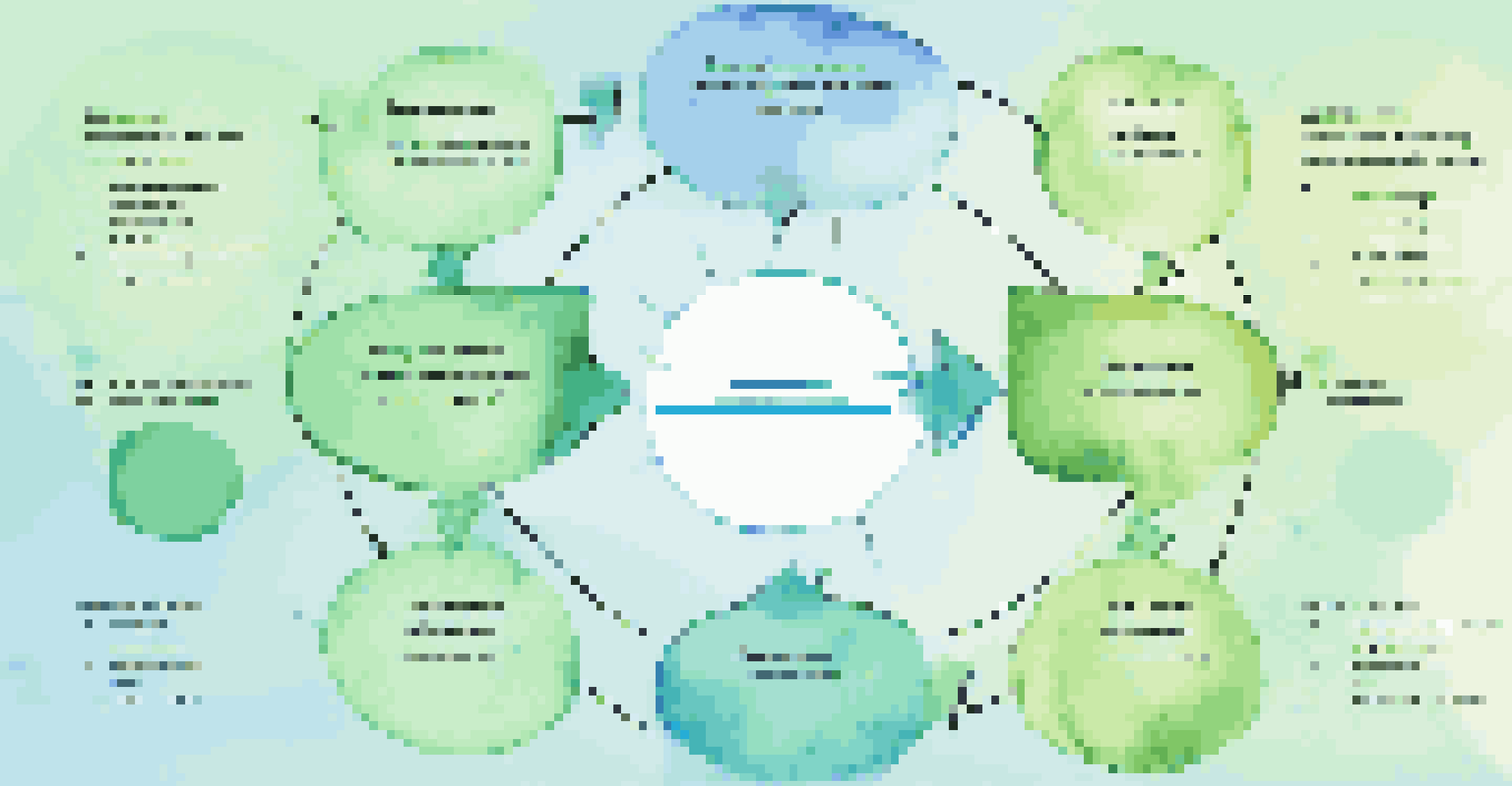Developing a DevOps Mindset: Key Principles to Embrace

Understanding the DevOps Mindset and Its Importance
At its core, a DevOps mindset is about fostering collaboration between development and operations teams. This cultural shift is essential in today’s fast-paced tech environment, where speed and efficiency are paramount. By breaking down silos, teams can work together more harmoniously, leading to quicker releases and more reliable software.
The strength of the team is each individual member. The strength of each member is the team.
Imagine a relay race where each runner passes the baton seamlessly; that’s the essence of DevOps. When everyone understands their role in the software delivery process, it creates a smooth flow of work, reducing delays and frustrations. This not only enhances productivity but also boosts morale, as team members feel more connected to the project’s success.
Embracing a DevOps mindset is not just about tools or processes; it’s about a fundamental change in how teams think and operate. This shift can lead to increased innovation, as teams are empowered to experiment and improve continuously. Ultimately, adopting this mindset sets the stage for a more agile and responsive organization.
Collaboration: The Heart of DevOps
Collaboration is the cornerstone of the DevOps philosophy. It encourages open communication and shared responsibility, where everyone involved feels accountable for the project’s outcomes. By fostering a collaborative environment, teams can leverage diverse skills and perspectives, resulting in more creative solutions.

Think of a symphony orchestra; every musician must play their part in harmony to create beautiful music. In a similar vein, cross-functional teams in DevOps must work together to ensure that development, testing, and deployment phases are in sync. This collaboration not only enhances the quality of deliverables but also accelerates the overall development cycle.
Collaboration Boosts DevOps Success
Fostering open communication and shared responsibility among teams enhances creativity and accelerates project delivery.
Tools like chat platforms and project management software can facilitate collaboration, but the key lies in cultivating a culture of trust and respect. When team members feel safe to share ideas and feedback, it leads to a more engaged workforce and ultimately better products. This culture of collaboration sets the stage for success in any DevOps initiative.
Automation: Streamlining Processes for Efficiency
Automation plays a vital role in the DevOps landscape by streamlining repetitive tasks and reducing human error. By automating processes such as testing, deployment, and monitoring, teams can focus their energy on more strategic initiatives. This not only saves time but also enhances the reliability of the software being developed.
Innovation is not born from the dream; it’s born from the struggle.
Consider the analogy of a factory assembly line; automation allows for a smoother process with fewer bottlenecks. In DevOps, automation tools can handle everything from continuous integration to infrastructure management, freeing up developers to concentrate on crafting innovative solutions. This results in faster release cycles and improved product quality.
Moreover, automation enables teams to quickly respond to changes and issues, ensuring that they can deliver updates and fixes rapidly. In an era where customer expectations are high, this agility is crucial. By embracing automation, organizations can maintain a competitive edge in the marketplace.
Continuous Improvement: A Never-Ending Journey
A commitment to continuous improvement is essential for a successful DevOps mindset. This principle encourages teams to regularly evaluate their processes and outcomes, seeking ways to enhance efficiency and effectiveness. By adopting a mindset of growth, organizations can stay ahead of the curve and adapt to changing market demands.
Think of continuous improvement as a journey rather than a destination. Teams can implement feedback loops, such as retrospectives, to assess what worked well and what didn’t after each project. This reflection allows them to learn from their experiences, making adjustments that lead to better results in future endeavors.
Automation Drives Efficiency
Implementing automation streamlines repetitive tasks, allowing teams to focus on innovation and respond quickly to changes.
Incorporating metrics and KPIs helps teams track their progress and identify areas for improvement. By celebrating successes and addressing challenges together, teams foster a culture of accountability and resilience. This ongoing cycle of refinement is what ultimately drives innovation and success in a DevOps environment.
Embracing a Culture of Experimentation
An essential aspect of a DevOps mindset is the embrace of experimentation. Teams are encouraged to test new ideas, tools, and methodologies without the fear of failure. This culture of experimentation fosters innovation, as team members feel empowered to explore creative solutions to complex problems.
Consider how scientists conduct experiments; they hypothesize, test, and learn from both successes and failures. In a DevOps context, this means creating safe spaces for teams to try out new approaches and technologies. By doing so, organizations can discover what works best for their needs and adapt accordingly.
Moreover, celebrating both successes and failures as learning opportunities reinforces the value of experimentation. When teams understand that not every experiment will yield positive results, they are more likely to take calculated risks that can lead to groundbreaking advancements. This mindset ultimately drives progress and keeps the organization agile.
Feedback Loops: The Key to Agility
Effective feedback loops are crucial for maintaining agility within a DevOps framework. They allow teams to gather insights from customers, stakeholders, and team members continuously. This constant flow of information helps organizations identify issues quickly and make necessary adjustments to enhance product quality.
Imagine a chef who tastes their dish at various stages of preparation; this iterative feedback process ensures the final product is delicious. In DevOps, regular feedback helps teams fine-tune their work, ensuring that they meet customer needs and expectations. This responsiveness is essential in an ever-evolving market.
Continuous Improvement is Key
Embracing a mindset of ongoing evaluation and feedback helps teams adapt and thrive in a dynamic market.
Incorporating tools for real-time feedback, such as monitoring and analytics systems, can further enhance this process. When teams can analyze data and receive input swiftly, they can pivot effectively and maintain a competitive edge. Ultimately, strong feedback loops lay the foundation for a responsive and successful DevOps culture.
Building Trust: The Foundation of a Successful Team
Trust is a fundamental element of a successful DevOps culture. When team members trust one another, they are more likely to communicate openly, share ideas, and collaborate effectively. Building this trust takes time and effort but is vital for creating a high-performing team.
Think of trust as the glue that holds a team together; without it, collaboration falters, and productivity declines. One way to build trust is through transparency, where teams openly share their goals, challenges, and successes. This openness fosters a sense of belonging and encourages individuals to contribute meaningfully to the team's objectives.

Additionally, recognizing and celebrating achievements helps reinforce trust within the team. When members know their contributions are valued, they feel motivated to continue collaborating and striving for excellence. Ultimately, a culture of trust not only enhances team dynamics but also leads to greater success in DevOps initiatives.